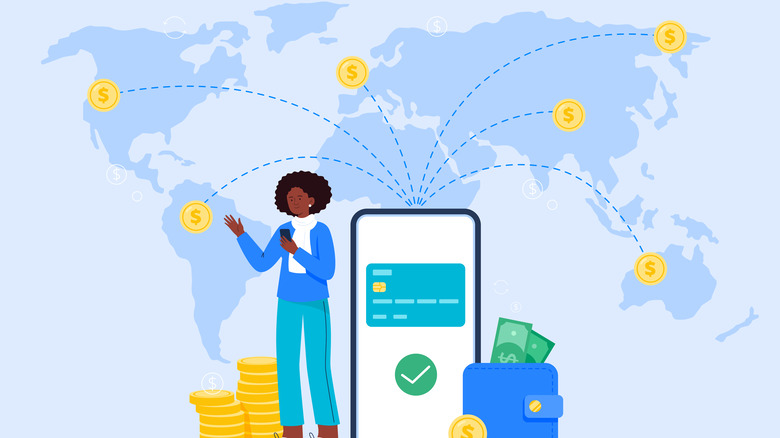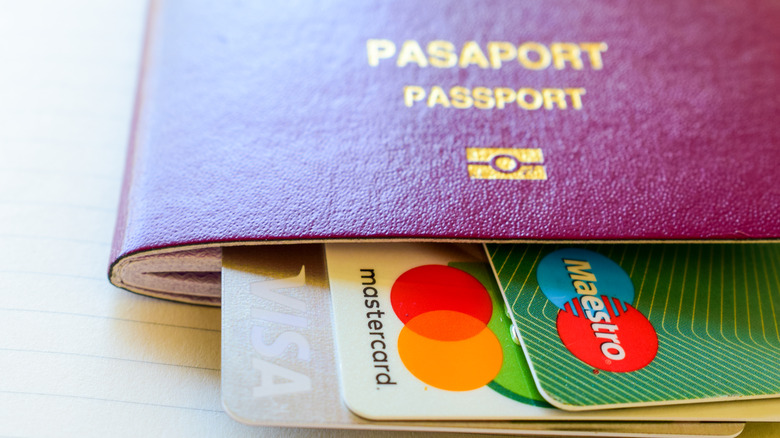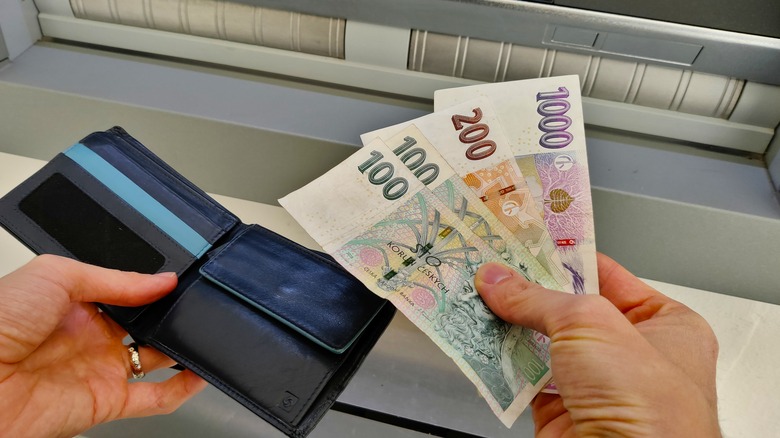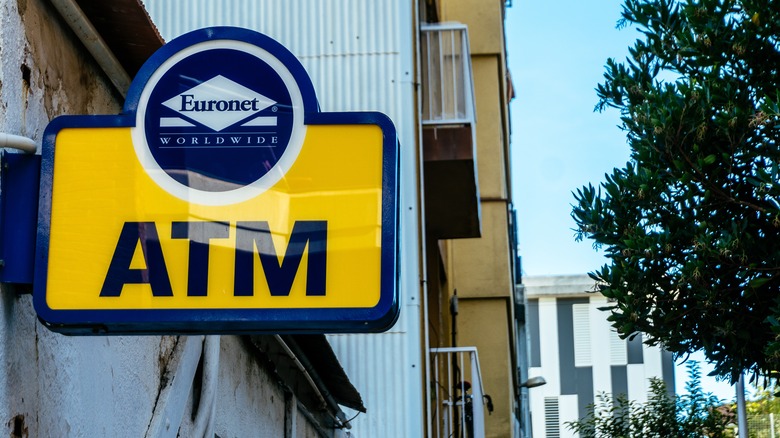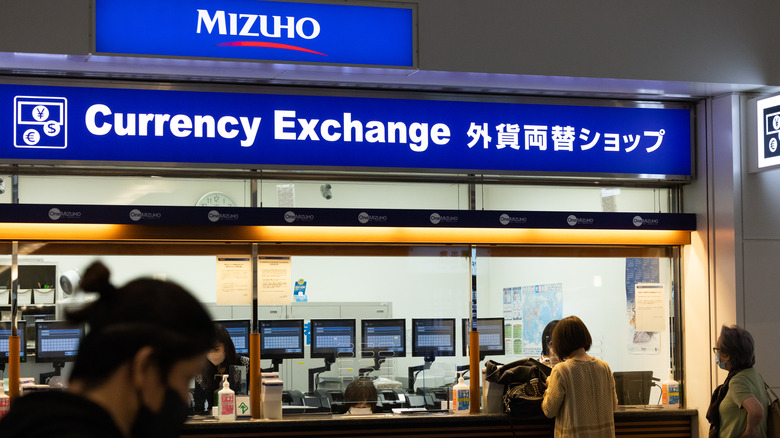How To Easily Avoid Pesky Bank Fees While Traveling
According to Forbes, 63% of Americans polled cited financial restraints as the primary reason they'd never traveled outside of the United States. And it's easy to identify with these would-be travelers. Traveling can be expensive. When you consider the cost of flights, accommodations, activities, dining, and entertainment, taking an international trip can easily seem out of reach — even for the savviest and most optimistic planner.
Barring unlimited funds and time, traveling takes a bit of finesse, insight, and knowledge to turn dream trips into realities. While traveling does cost money, the goal is to find value where possible and eliminate unnecessary expenses, whether you're beginning a digital nomad trek or planning a family vacation.
Of all the costs associated with traveling, the one expense that seems to be the most unnecessary are foreign transaction fees. Fortunately, there are a few ways to minimize or even eliminate these pesky charges.
Reward yourself with the right credit card
Paying money to use your own money is annoying (maddening?), especially when you're budgeting for travel. And when you consider credit cards, you're already paying a percentage through your annual percentage rate (APR). Add your APR with any FTFs (foreign transaction fees), and you get a useless but expensive acronym. However, primarily using credit cards when traveling can be a wise decision.
First, if you use a credit card abroad, you and your financial institution are better equipped to spot and stop travel-related fraud. It's easier to reimburse fraudulent credit card purchases than debit card purchases. Also, if a scammer accesses your credit card, they can only defraud you of your credit card limit versus, you know, your entire bank account. That said, the convenience and relative safety of using your credit card while traveling can cost you.
According to Bankrate, foreign transaction fees of credit cards typically range from 1% to 4% of your total expense. While this may not seem like much, these fees can add up quickly, especially if you're traveling for long periods of time. Fortunately, there are credit cards with low or no foreign transaction fees.
Do your research to find a travel-friendly credit card. Along with no FTFs, many of these credit cards reward spending with travel miles or points to put toward your next flight or hotel stay.
Remember, not all ATMs are created equal
Another place you'll find foreign transaction fees abroad are at ATMs. Different banks have various policies regarding using an ATM outside of their network, but typically, you're charged a flat fee for withdrawing money from an out-of-network machine. This holds true both within the United States and abroad.
So, if you use an ATM outside of your bank's network abroad, you'll probably face both the out-of-network fee and a foreign conversion fee. According to The Points Guy, this could mean a $5 flat fee with a 1% to 3% foreign conversion fee to boot. On the high end, this means a $50 withdrawal would cost you $11 abroad. That's a 22% surcharge!
To minimize your flat fees, be selective regarding the ATMs you use. When traveling abroad, a good rule of thumb is "you'll always pay for convenience." The ATMs you find in airports, hotels, and convenience stores tend to always charge higher conversion fees and flat fees. Instead, use ATMs at major banks. The rates will almost always be lower, and the ATMs will definitely always be safer.
Open an account with a travel-friendly bank
While using the right ATMs can help lower withdrawal fees, opening an account with a travel-friendly bank can eliminate them altogether. According to Nomadic Matt, the best approach to avoid ATM fees is to bank with an institution within the Global ATM Alliance, which is a network of banks that share international ATMs.
Currently, the banks of the Global ATM Alliance include Bank of America, Barclays, BNP Paribas, Deutsche Bank, Banca Nazionale del Lavoro, Scotiabank, and Westpac. If you bank with one of these institutions, you could travel from the U.K. to Chile to Papua New Guinea without paying any out-of-network ATM fees.
Keep in mind that it may take a few weeks to open a bank account, deposit funds, and receive a debit card, so plan accordingly. Along with saving you money on foreign transaction fees, these accounts allow you to set aside a specific amount of money for travel. By separating these funds from your primary bank, you can minimize the potential financial risk of fraudsters. And it may help you budget better.
Be careful when exchanging currencies
Lastly, to save money on foreign transactions, be smart about currency exchanges. While some people appreciate having foreign (domestically accepted) cash on-hand upon arrival, the exchange rate through an ATM will almost always be better than a currency exchange kiosk. So, if you really want cash before leaving the airport, then use an ATM at the airport. Even though this ATM won't be the cheapest, it'll still be cheaper than exchanging currency at an airport.
The sheer amount of currency exchanges at popular traveling destinations can make you feel pressured to use them. Don't. Their rates are the worst. Simply find an ATM with minimal fees, or if you really want cash upon landing, exchange some currency at your personal bank before leaving.
Exchanging currency upon returning home is another matter. Depending on the currency, some banks will buy back foreign currency, while others won't. In this case, you may need to just exchange the funds at your home airport and take the loss.
Or, according to Nerd Wallet, you can choose to donate your foreign currency to UNICEF's Change for Good program. Ten international airlines participate in the program, accepting and donating all types of currencies to improve the lives of children worldwide. And since you've now saved money by eliminating pesky travel fees (and enjoyed a wonderful trip), you should have a bit extra to share.
